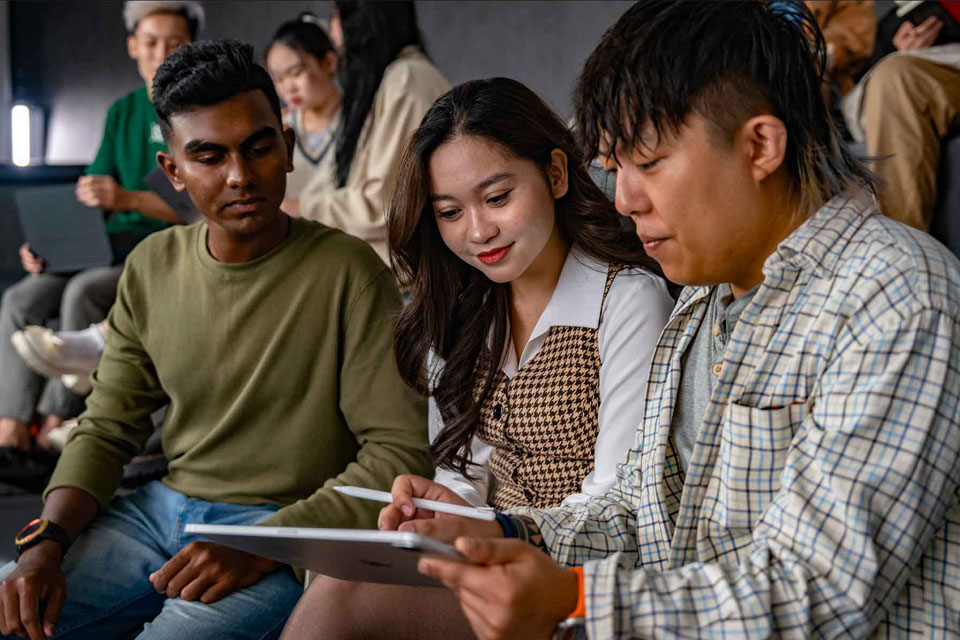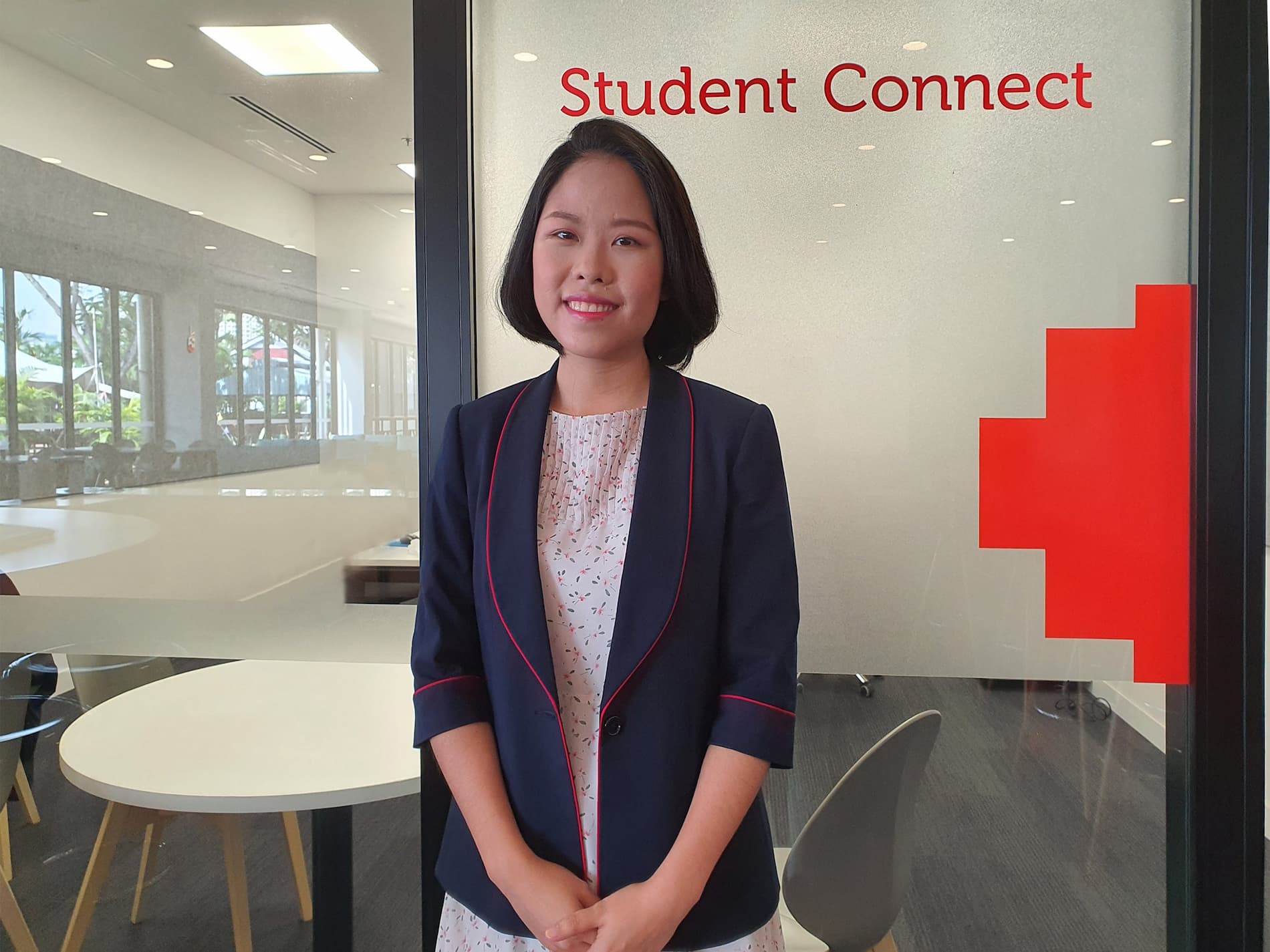About blended learning

Experience blended learning
Join the "Navigating Blended Learning" course and gain a comprehensive understanding of this innovative approach to education.
Blended learning means that you will learn through a mix of face to face and online activities.
This may be in the form of readings, videos or other kinds of learning materials that you can access on demand through Canvas (our digital learning platform). Sometimes, you may be invited to participate in online discussion forums or simulations.
This is complemented by timetabled classes on campus, such as lectorials, tutorials, practicals or workshops, which provide ample opportunity for you to interact and collaborate with other students and your teachers.
RMIT's focus on active learning ensures that students will be engaged in the learning process.
People learn best through active learning – by being engaged in the learning process. Cognitive science research shows that learning occurs by doing - engaging in an activity rather than passively watching or listening. Students learn through elaborative rehearsal, by thinking about the importance of new material and connecting it to their prior beliefs, knowledge and mental modes.
We offer sections of our courses online in order to simulate the experience of interacting in a modern workplace, to prepare you for life and work.
Through blended learning, you will benefit from RMIT’s rich digital learning environment and the dynamic nature of face-to-face learning. As part of the curriculum, you will be asked to regularly log online and participate in a range of activities. You will be able to access interactive learning materials and engage with your university lecturers and classmates. The online components of the course are essential and tied-in with the face-to-face classroom learning activities.
We offer sections of our courses online in order to simulate the experience of interacting in a modern workplace, to prepare you for life and work.
It can take some time to transition to an international university that has a strong focus on preparing graduates who will be digitally literate and successful in their chosen professions. RMIT provides support for all new students, both academically and socially. A selection of these can be found below.
Research evidence shows that blended learning improves learning outcomes, increases student satisfaction and can make courses more accessible to a wider range of students.
Blended learning improves student retention, student engagement. and improves student outcomes.
Blended learning is also a digital literacy strategy that supports student and staff development and enables students to take advantage of resources, not only at a technological level but also at a pedagogical one. This includes the benefits of community-building and collaborative learning opportunities in on-campus environments.
Due to its success, universities across the United Kingdom, the USA and Australia have adopted blended learning as their default way of learning. This includes universities in the global top 20 of QS Rankings.
Authentic assessment requires students to perform real-world tasks and demonstrate knowledge, skills, and attitudes that they need to apply to problems and situations in contemporary work and life.
A core part of every student’s experience at RMIT is to learn how to use a blend of digital tools, and to take part in face-to-face activities.
You will find readings, videos, online discussion forums, simulations or other kinds of digitised learning materials that you can access on demand and learn at your own pace. The use of digital study tools together with class on campus provides many opportunities for you to interact and collaborate with other students and your teachers.
RMIT’s intention is to nurture a 21st century skillset in our graduates, who will be confident both online and offline in a professional setting.

The human touch for all student enquiries
Student Connect provides simple ways to access student service and support at RMIT Vietnam.
Online study support
Set up your computer for study
- Make sure that you have a good connection. Seat yourself close to your wi-fi router, or install a wi-fi adaptor.
- If the class is live (synchronous), close all other tabs in your browser window, and all other unnecessary windows
- Let your facilitator know if you cannot log on to any of the live sessions – in many cases, these sessions will be recorded and you can download and watch when things may be a bit quieter or when the internet is not lagging.
- Invest in some headphones, a microphone and a camera if you don’t already have some. You will find recorded material is much much easier to hear if you have headphones on, while the microphone and camera help with live class. If you have a microphone and camera attached, all the better.
Get the most out of your online study
- Find a relatively quiet time to study, a lot of what you can do to study in your courses can be done at times when others may be less likely to use the family computer or are busy (noisy) in the house.
- Go through the study material that has been prepared – PowerPoint slides, pdf documents, readings. Most of what you will need to know is contained in these materials.
- Remember to take notes about key points and remember when reading always think about the questions you hope to find answers to. This purposeful approach to reading helps you to retain information in your memory! If you don’t know what questions you should be answering when reading ask your lecturer.
- Use the communication tools in your course (e.g. discussion boards, message or chat features) to ask questions and participate in the course activities. Just like your muscles if you want them to develop you have to be active, the same goes with your brain. Listening and reading are good learning exercises but you can supercharge your learning by discussing, asking questions, writing, posting your thoughts in the forum, and doing other activities that are in your course e.g. quizzes, practice exercises etc.
- If you don’t understand something post your questions in the forum or on the chat tools that are used in the course. You will find your classmates and lecturer are often keen to help. And when you are on the forum don’t be shy in helping someone else with their questions – remembering one of the best ways to learn something is to try and teach it!
- Have a schedule where you discipline yourself to learn. Most students fail in University not because they are not smart enough - it is because they fall behind in their studies and can’t catch up. So work hard each day, because each day matters. Set some time every day to do work on each course. And of course, have breaks in between so you refresh yourself.
- Studying is hard, but doing it with friends can make it easier. Set-up your own study buddy group so when you are reading and reviewing materials you can talk about it with friends. For a productive 60 minutes using a study buddy group try: everyone reads for 20 minutes – discuss with friends for 20 minutes - then everyone writes for 20 minutes what they have learnt.
For further assistance with studying effectively, please approach your lecturers and the services listed below.
Attend your online orientation.
An invite will have arrived from your school. This will help you
- Get to know available student services (including Student Connect, Student Academic Success, Library, Mobility, Wellbeing, Student Life, IT Services, Student Council, Student Clubs) and must-know contact points.
- Collect essential information about Get ready program and including your Student ID card.
- Get connected to new friends, lecturers and staff.
- Get answered your questions related to study program and student life.
- Equipped with crucial knowledge and skills to get ready to make the most of your student life at RMIT.
- Learn how to log into your online portal
Log in to our learning management system, Canvas, using your student number and password.
Each school will have provided you with access to course content. You can refer to each school's section, or refer to the email that was sent to you.
If you require technical support such as inability to access emails, log a ticket with our IT department at https://rmititsm.service-now.com/sp/.
Let your facilitator know if you cannot log on to any of the live sessions – in many cases, these sessions will be recorded and you can download and watch when things may be a bit quieter or when the internet is not lagging.
During class, you can raise your hand to ask a question, or simply speak up like in a live setting.
Lecturers are also available via drop-in sessions, or for one-on-one sessions by appointment
RMIT uses authentic assessment, and has done so since 2017. All students will be assessed as ready for life and work, by tasks set in real-world settings.
Your lecturers and the Student Academic Success team provide online one-on-one support.
- Library resources 24 hours a day
- The "Ask A Librarian" chat service is available via the library website and in Canvas
- The online library provides 24/7 access to learning materials such as ebooks, ejournals and LinkedIn Learning
- Online consultations and trainings and workshops with Liaison Librarians are available
- Free book deliveries via post can be organised for students
- Library assistance via social media is offered
- Help with assignments and project research, including how to cite and reference is available
- Easy-to-use online learning tools and resources, including downloadable recordings
- The online study portal, which can be used to
- Access learning materials, reading lists and study guides
- Participate in online classes, seminars and live chats
- Manage enrolment and fees, access student email
- Get IT and Library support
- Access study and personal support resources
- Connect with career support
- Learning Advising will be offered online for all RMIT Vietnam students.
- Program Tutors offer their service online when you need it.
- See the Learning Lab Vietnam for tutorials on writing, maths, English, assessment types and more
Personal support
Lonely? Need someone to speak to? Not coping at school?
We offer face-to-face confidential services (*) to our students on both the Saigon South and Hanoi City campuses. Please book an appointment by emailing counsellor@rmit.edu.vn
(*) Consultations are available in English and Vietnamese.
For after hours mental health emergencies please contact International SOS 24 hour assistance centres:
- (+84) 28 3824 0555 (Ho Chi Minh City);
- (+84) 24 3201 2533 (Ha Noi)
or attend FV Hospital (Ho Chi Minh City) or Hanoi French Hospital (Hanoi).
Our Equitable Learning Service supports students with disabilities, learning differences, medical and/or mental health conditions as well as those who care for those experiencing these conditions.
We do this by assessing the impact your condition is having on your study and learning. We can develop an Individual Access Plan to support you through your learning experience.
We are committed to providing a respectful and safe place to study and work, including providing support for students who experience cyber-bullying while studying online.
